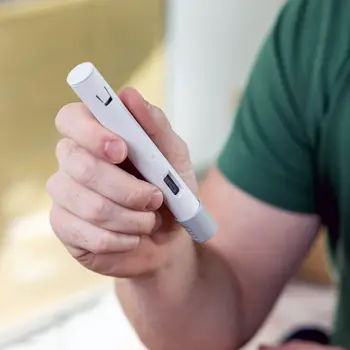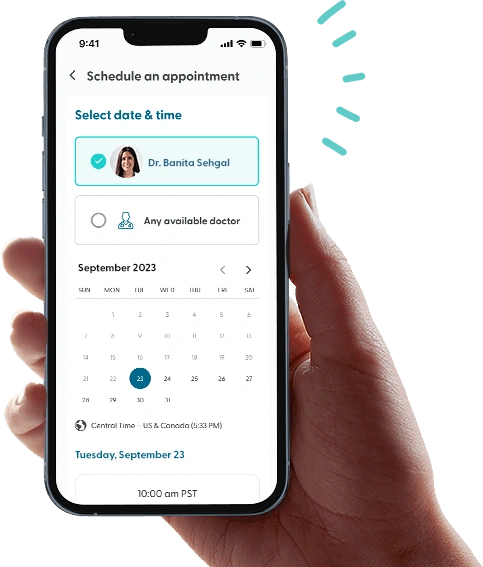Ozempic Side Effects: Here’s What You Should Know
Ozempic is a weekly injection typically used for treating and controlling diabetes. In higher doses, Ozempic is also FDA-approved for managing obesity and other weight-related medical problems.
This medication belongs to a class of drugs called glucagon-like peptide-1 receptor agonists (GLP-1s), which are medications used for treating type 2 diabetes and weight management.
Typically, Ozempic is well-tolerated, meaning it may cause little to no side effects.
While healthcare providers typically start patients off on a low dose to reduce the likelihood of side effects, some people may still experience adverse reactions to Ozempic.
In this article, we’ll discuss what you may experience while taking Ozempic and some important best practices to follow when using this medication.
Get prescription weight loss medication online.
Find out if you're eligible for GLP-1s, and get started on your weight loss journey.


Why Does Ozempic Cause Side Effects?
It’s important to first understand how Ozempic works and the impact it has on the body, as its mechanism is the cause of most side effects.
Ozempic works well for weight loss because it induces satiety, which is the feeling of fullness after a meal. This suppresses the appetite and may result in you eating less.
This drug also prompts the pancreas to produce insulin, the hormone that regulates blood glucose in the body. This may drastically alter your blood sugar levels.
It also slows down a part of the digestive process called gastric emptying. This means that the food you eat will stay in the stomach longer, contributing to feeling fuller.
Common Side Effects of Ozempic
Most side effects of Ozempic are the result of this medication's influence on the digestive process and how it alters blood sugar levels in the body.
Key Point: Get Medical Support for Severe Side Effects
Not everyone will experience side effects while taking Ozempic, and the severity can vary from one person to the next.
Be sure to consult with your healthcare provider for guidance and support if you experience adverse reactions that disrupt your day-to-day life.
Nausea
Nausea is one of the most common side effects of Ozempic.
The exact reason why it causes nausea is not fully understood, but some research shows that it’s related to how the medication affects the gastrointestinal system.
As the food you eat will stay in your stomach longer, this can also lead to nausea. Nausea symptoms could be temporary or may last for a few weeks after you start taking Ozempic. You may also experience nausea if your doctor increases your dosage.
Vomiting
Some patients may experience vomiting as a side effect of taking Ozempic. Similar to nausea, this symptom is likely due to the drug’s impact on gastric emptying. As the emptying of the stomach is delayed, an excess of food may accumulate, which can result in discomfort and vomiting.
For most people, vomiting will be mild and temporary. It typically occurs when you first start taking Ozempic and should ease within a few days or weeks.
Diarrhea
In some cases, taking Ozempic may cause diarrhea. Due to the medication’s influence on the gastrointestinal tract, it could cause increased mobility and more rapid transit of stool through the intestines.
This common side effect usually subsides within a few weeks of starting the medication.
Constipation
While less common than diarrhea, some people taking Ozempic may experience constipation.
The movement of stool through the digestive system could be slowed by Ozempic. Also, stool may build up in the colon and become difficult to pass due to slower gastric emptying.
Stomach pain
Some patients using the Ozempic injection pen have reported stomach flu symptoms, cramps, and pain.
Abdominal pain and discomfort can be caused by how this medication changes stomach acid secretion and its impact on how food moves through the digestive system.
Indigestion
As taking Ozempic affects the stomach and digestive system, it is possible to experience indigestion, also called dyspepsia.
Changes in stomach acid levels and the slowing of gastric emptying can cause indigestion and discomfort in some patients.
Loss of appetite
You may temporarily experience a loss of appetite while taking Ozempic.
This side effect results from the drug’s impact on the satiety center in the brain that controls how full you feel, which causes a reduced desire to eat.
Headaches
Although the exact cause of headaches as a side effect is not well-established, Ozempic may affect the blood vessels and neurotransmitters in the brain. This can result in mild to severe headaches.
Fatigue
As the primary purpose of this drug is to control blood sugar levels in diabetic patients, you may experience changes in your blood glucose when you first start taking Ozempic.
High blood sugar can cause fatigue and tiredness in some individuals. Ozempic can also affect energy metabolism — which refers to the process of the body turning nutrients into energy — which may cause fatigue.
Dizziness
Ozempic causes changes in blood sugar and can trigger high blood pressure. Both of these factors often cause dizziness.
Low blood sugar
Also referred to as hypoglycemia, low blood sugar has been known as a side effect for some people who have taken Ozempic.
This particular side effect is more common if the drug is used in conjunction with insulin or other diabetes medication — which we will discuss shortly.
People who take Ozempic to lose excess weight might start fasting or changing their diets drastically once they start taking the drug. This can also lead to lower blood sugar levels.
Key Point: How to Treat Low Blood Sugar
To quickly treat hypoglycemia, eat or drink fast-absorbing carbohydrates such as sugary foods or drinks like non-diet soda.
Be sure to inform your healthcare provider if you experience hypoglycemia while taking Ozempic, especially if you are diabetic.
When to Seek Emergency Medical Help for Your Side Effects
Most of the side effects outlined above are temporary and will pass after a few weeks of taking Ozempic.
However, there are some cases where you should seek emergency medical assistance for your side effects, especially if you experience:
An allergic reaction to the medication; serious allergic reactions can cause trouble breathing, swelling, hives or skin rash and a weak or rapid pulse
Severe pain in your upper stomach, spreading to your back
Nausea and vomiting that do not resolve
Unusual mood changes or thoughts about harming yourself
If you feel that any of your side effects are life-threatening or you think you have a medical emergency, call 911 or get to an emergency room.
Best Practices for Taking Ozempic
If you’ve been prescribed this injection, it’s important that you take the medication properly. Following these best practices may help you avoid certain side effects.
Always follow your healthcare provider’s dosing instructions. Don’t alter your dosage or the frequency of the injection without consulting your healthcare provider first, as this could lead to serious health problems.
If you feel that the prescribed dosage isn’t appropriate or are struggling with unpleasant side effects, speak to your healthcare provider before changing your dose or medication schedule.
Never share an Ozempic injector pen with anyone else. You should be the only person using your device. If shared, the injector pen can spread infections or disease.
Discard the injector pen 56 days after the first use or if less than 0.25 mg is indicated by the dose counter.
If you miss a dose of Ozempic, use it as soon as you remember if it is within five days after the missed dose. If it has been more than five days, skip the missed dose. Don’t take more than one dose to catch up.
If you want to change to a different weekly injection day, start your new schedule after at least two days have passed since your last dose.
Key Point: What to Tell Your Healthcare Provider Before Taking Ozempic
Ozempic has recently gone viral online for its weight loss benefits. If you consult with a healthcare provider to get a prescription for Ozempic, it’s important that you are completely honest with them about your current health status and your family history.
You should tell your doctor if you have ever:
- Had a stomach or intestinal disorder
- Experienced kidney problems or kidney disease
- Noticed any signs of thyroid tumors like an unusual growth or lump in the neck or trouble swallowing
- Had multiple endocrine neoplasia type 2 (MEN2), which are tumors in your glands
You should also let them know if you have a personal or family history of medullary thyroid cancer, as some research has found that Ozempic can cause a type of thyroid tumor (thyroid C-cell tumors) in animal studies.
Medical Interactions Associated with Ozempic
If you are taking other medications with Ozempic, there is a chance that they could cause drug interactions, which is when a medication’s efficacy is affected by certain substances.
Ready to achieve your weight loss goals?
Shed pounds with GLP-1 medication prescribed online by licensed healthcare providers.


Absorption of oral medications
As mentioned above, Ozempic slows down the emptying of the stomach to regulate blood sugar. However, this slowed gastric emptying can affect how other medications you take get absorbed.
It’s important to tell your healthcare provider about any medications you are using before they prescribe Ozempic so that they can fully assess any potential absorption issues.
Insulin
If you take insulin to manage your diabetes, healthcare providers will often prescribe Ozempic as a complementary medication.
When Ozempic is taken alongside insulin, it can increase your risk of low blood sugar.
Both insulin medications and Ozempic work to lower blood sugar levels — using them together could result in hypoglycemia, which can cause several side effects.
Often, doctors will prescribe a low initial dose of Ozempic to start monitoring you for any interactions.
Key Point: Monitoring Your Blood Sugar
If you are diabetic and take Ozempic and insulin, it’s important to test your blood sugar regularly so that you can let your healthcare provider know if your levels are abnormally high or low.
Sulfonylureas
Another medication that can cause notably low blood sugar when taken with Ozempic is a medication class called sulfonylureas.
Like insulin, this medication also stimulates your pancreas to produce insulin without necessarily eating food.
So, similar to the reasons discussed above, taking Ozempic and this medication together can cause your blood sugar levels to decrease.
Glinides
Typically taken before meals, glinides have a similar indication as the medications mentioned above.
Glinides stimulate the pancreas to produce insulin. However, this medication works faster and for a shorter period than insulin drugs.
Combining glinides with Ozempic can result in hypoglycemia. Your doctor will likely manage this possible interaction by prescribing a low initial dose of Ozempic as they would with insulin.
Where Can I Learn More About Ozempic to Lose Weight?
If you’re struggling with weight management, LifeMD can help you reach your goals for good. The LifeMD Comprehensive Weight Management Program combines groundbreaking medications, lab testing, and the knowledge of leading clinicians to create a highly effective — and truly sustainable — weight-loss approach. If necessary and if you qualify, healthcare professionals can prescribe weight management medications, like Ozempic.
More articles like this
Feel better with LifeMD.
Your doctor is online and ready to see you.
Join LifeMD today and experience amazing healthcare, discounted labs and prescription medications... plus around-the-clock access to medical guidance.

GLP-1
Ozempic® Wegovy® Zepbound®
This is it! Be part of the weight loss movement everyone’s talking about.
Get Started Now













